Water Research Lab Tour
By Aidan Ocampo, Iphigenie Bera, Sara Bhaidani
For most, the first destination on Northwestern’s Global Engineering Trek (GET) to Israel left students with a lasting impression of the significant role water plays on a regional and global scale. As Wildcats visited Technion, they were provided a valuable introduction to groundbreaking research into solving the most-pressing Israeli water challenges.
Among the group of world-class researchers at Technion’s Grand Water Research Institute (GWRI), students heard from Dr. Alex Furman about the history of water resources in Israel and its approach to solving their urgent water issues. Despite its young age as a country, the almost 75 years of Israeli history is underscored by the nation’s need to develop and sustain powerful new methods of providing water to its densely populated, rapidly growing population.
In response to declining access to natural water resources, Dr. Furman highlighted three innovative approaches to treating water and harnessing natural sources in the region. Prior to the 1980’s, the first Israeli attempt to control water in the region began with the construction of the Galilee Sea in 1930. Decades later, the draining of the Hula Valley provided farmers with a revolutionary form of agriculture.
Leading the world in developing new water technology, Israel implemented one of the first wastewater reuse programs beginning in the 1980’s. While primarily used to supply water to the agricultural industry, this process brought the water to acceptable standards by removing contaminants and particulates such as nitrogen and boron, an element commonly found in laundry detergent.
As the treatment of wastewater continued to support Israel’s agricultural sector, researchers continued developing revolutionary methods of treating wastewater. At the turn of the century, the implementation of desalination technology provided an entirely new opportunity for supplying drinking water to Israel’s growing population. Contrary to the commonly used desalination technique of thermal desalination which consumed a lot of energy, Israel uses mainly reverse osmosis. Reverse osmosis requires a semi-permeable membrane to filter out salt and other particles. There is ongoing research that seeks to optimize membrane reverse osmosis and how to mix desalinated water with other water sources in Israel.
Following the presentation, students toured the various labs performing this research at Technion’s Agricultural Engineering Center. Students learned about water technologies that make water treatment low-cost and environmentally friendly. One of the labs focused on the study of water transportation through membranes used in reverse osmosis with the goal of making membranes durable and versatile. High evaporation rates of Israel’s semi-arid climate make underground sources a good storage of water. This introduced the ongoing research for soil aquifer treatment which focuses on nourishing water-purifying bacteria by injecting oxygen into the soil. The lab tour ended with non-invasive water quality monitoring using spectral sensing technology of soil.
Israel’s technology and innovation provide a rich study for water resource management, offering a breadth of knowledge on wastewater reuse, water distribution, water reclamation, and water storage. As students continue their trek through Israel, they look forward to exploring more of the country’s global leadership in water technology.
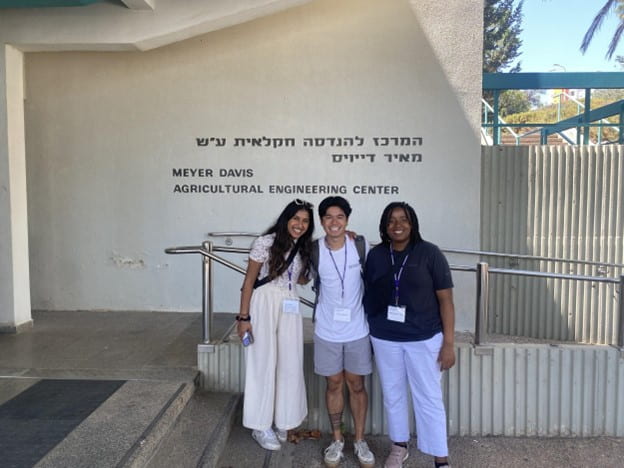
Northwestern students (from left to right) Sara, Aidan, and Iphigenie, at Technion’s Meyer Davis Agricultural Engineering Center where they toured research facilities exploring water technology solutions.
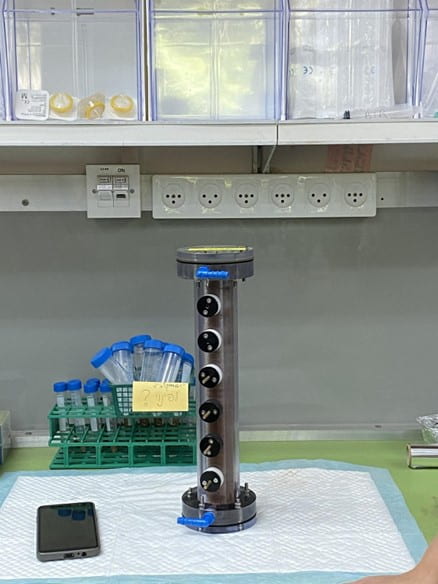
Technion lab tool used to explore the transportation of
contaminants through soil by measuring electric charges delivered through electrodes in the soil.
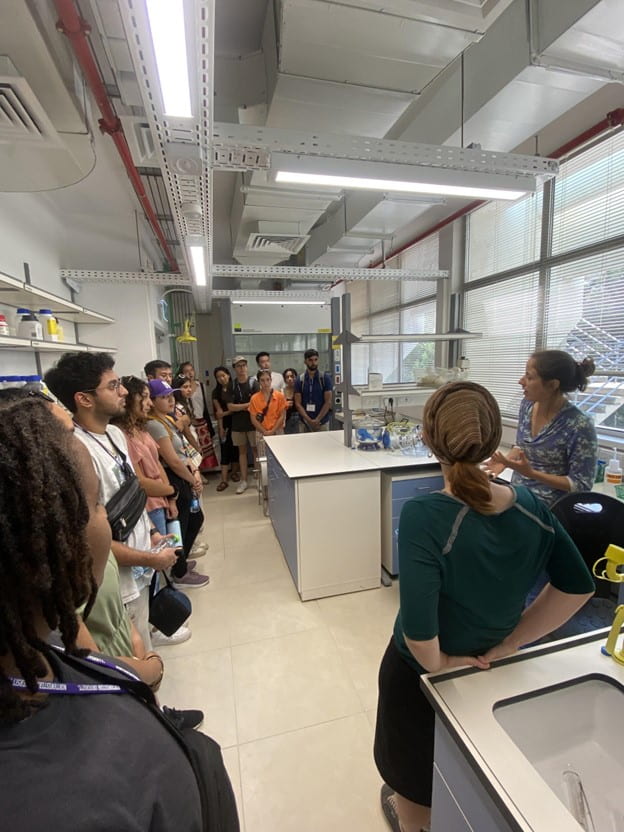
Northwestern students hear from lab manager at Technion lab researching membranes used in reverse osmosis at desalination plants.
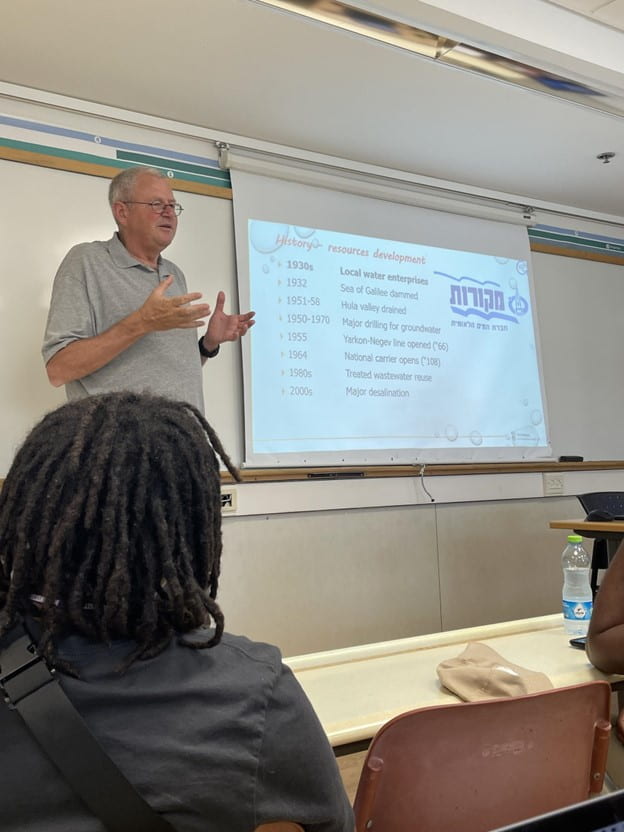
Dr. Alex Furman address Israel’s history of water innovation in presentation to Northwestern students.
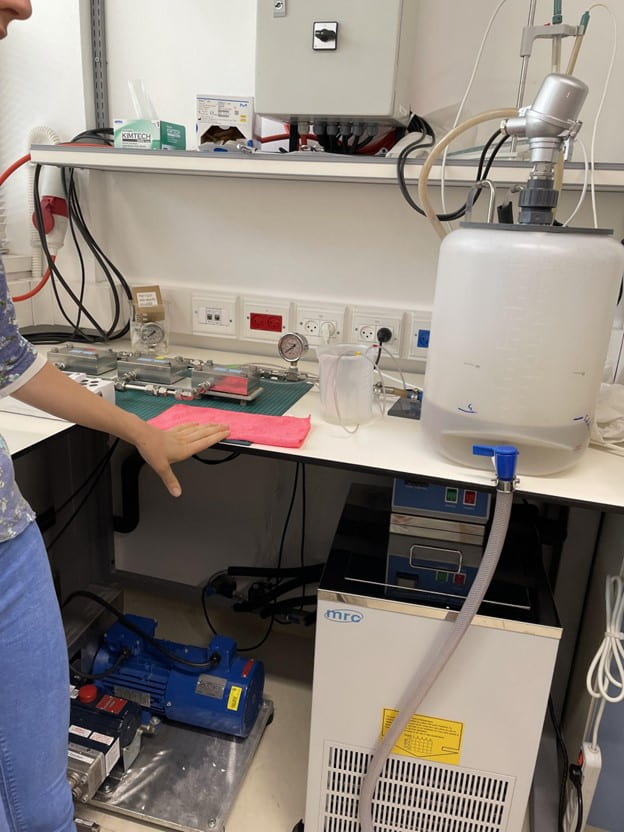
Technion research facilities studying the efficacy of different membranes used in reverse osmosis for desalination of water.
The Global Engineering Trek (GET) to Israel is jointly organized by the Northwestern Center for Water Research (NCWR) and the Israel Innovation Project (IIP). This program is focused on the topic of water (GET Water-Israel) and is offered to all first- and second-year Northwestern undergraduate students. GET Water-Israel is co-sponsored by McCormick Global Initiatives, the Institute for Sustainability and Energy at Northwestern (ISEN), the Crown Family Center for Jewish and Israel Studies, NCWR, and IIP.

